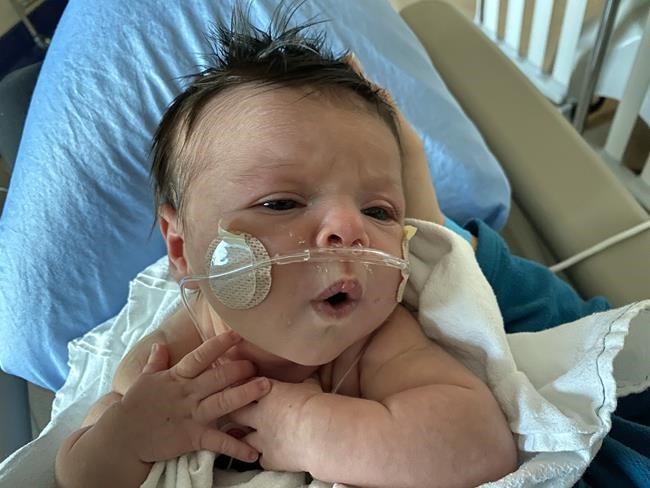CALGARY — When five-day-old Nora Forrest was first hospitalized with COVID-19, her parents didn't know if she would survive.
"We weren't sure that we're bringing her back home or we're going to bring an empty car seat home," said her mother, Ceyda Alaf-Forrest.
Nora was a full-term, healthy baby when she was born on Nov. 22. The following night, her mom started feeling ill. Then Nora's dad, grandmother and older sister got sick.
The family had been for three COVID-19 tests before and all came back negative. They suspected this would be the same, but booked tests anyway.
Her parents took Nora to the Alberta Children's Hospital when she came down with a fever on the night of Nov. 27.
They were still there when their test results came in the next morning by text. The whole family was positive for COVID-19.
In the emergency room, doctors were debating whether to move Nora into intensive care or a regular ward.
"Suddenly everything changed because nurses got really nervous and they started talking quicker to each other," said Alaf-Forrest.
Nora wasn't breathing regularly. She was bound for intensive care.
"They were literally running and bringing the baby in the little bassinet," said Alaf-Forrest. "That made me think that's it. She might not even make it."
It was hard for Nora's parents to watch as nurses tried to draw blood from her tiny veins.
The baby was sedated while a breathing tube was inserted.
When Nora came to, it was evident from her red face that she was crying but the tube meant no one could hear her.
"It's like watching a horror movie but the sound is mute," said her mother. The baby was swaddled tightly to stop her from grabbing the tube.
"They kept calling her 'feisty' in the hospital."
After about three or four days, Nora improved, though she was fussy. After a week, she was calmer and able to sleep.
With COVID-19 being such a new virus, the medical team did not have much research to inform its decision-making.
The parents said they were impressed by how different specialists collaborated on Nora's care and consulted with a team in the United States that was more familiar with COVID-19 in infants.
"Everybody just gets together and talks about what they're seeing," said Nora's father, Ben Forrest. "It was quite amazing."
The hospital wanted as few COVID-19 positive people in the hospital as possible, so Nora's father volunteered to go home while his wife stayed with her. When Alaf-Forrest was exhausted from lack of sleep, a nurse volunteered to rock the baby.
Nora was discharged Dec. 9 after nearly two weeks. Now she's gaining weight and is alert.
"We sometimes even get a smile out of her," said Alaf-Forrest.
The parents and their 20-month-old daughter, Hazel, all got over their symptoms within a week.
Alaf-Forrest's mother, who travelled from Turkey to help with the new baby, was hit harder and took about 10 days to recover.
Forrest said he's putting together a "time capsule" of news stories about Nora's ordeal so that he can show them to her when she's older.
He said public health measures to slow the spread of COVID-19 may be inconvenient, but they are in place for a reason.
"We wouldn't want anybody to go through what we had to go through."
This report by The Canadian Press was first published Dec. 16, 2020.
Lauren Krugel, The Canadian Press



